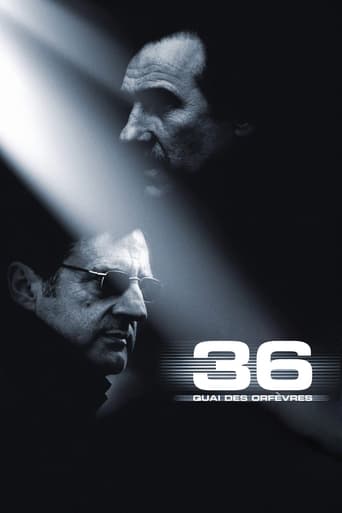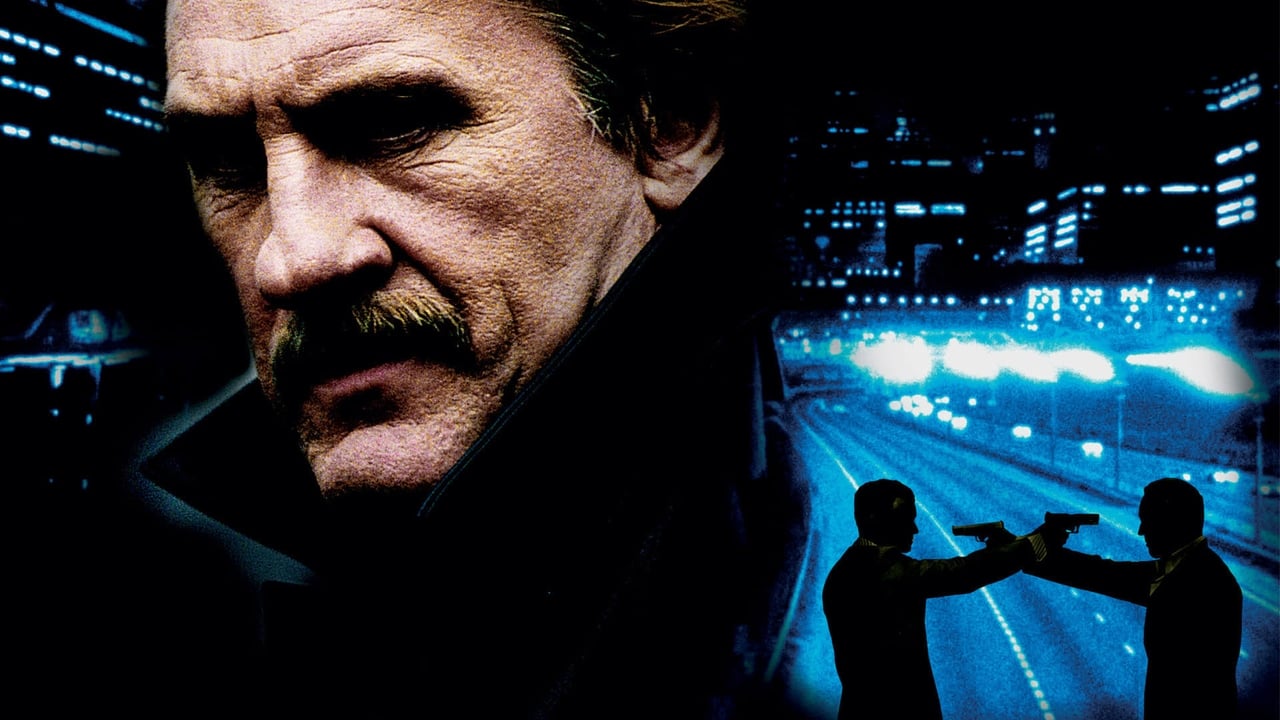JoeKulik
36th Precinct (2004) is a very good crime narrative. Gerard Depardieu and Daniel Auteuil, two premier French actors, both deliver solid performances as great cops who both cross over to the wrong side of the law when they think that's it's to their advantage to do so. This film has a very complex storyline that is nonetheless well thought, and executed in perfect detail. No unbelievable coincidences, or unexplainable "holes" in the storyline. This film, therefore, has a very "tight" screenplay. The cinematography is great. The whole supporting cast gives excellent performances. This film left me wondering if strictly obeying the law is always the right thing to do. Hence, at least for me, this film is morally ambiguous in some ways. There is actually a number of different subplots in this film, but they are all well coordinated into portraying an overall consistent and believable film. There is some violence in this film, including a big shootout between the cops and the bad guys right in the middle of the street. However, none of the violence is in anyway gratuitous, and is very much integral to the storyline. This is definitely a good cops versus bad guys film, although sometimes it's hard to tell who the real bad guys are. This is a film that I'd like to view again just for the sheer enjoyment of it, and because it has much artistic merit.
roland-wirtz
I was watching a lot of french crime films lately and was pleasantly surprised by many of them. They have something American crime films don't have anymore: a soul. 36 is pretty good. The director obviously loves Michael Mann a bit much because he stole many things from him (even the poster reminds me of Heat). It's not as good as Heat (not even close) but it delivers the goods. The actors were the real highlight of the film. Daniel Auteuil playing the head of robbery unit was terrific. Gerard Depardieu was also impressive. He kinda reminded me a fat version of Nick Nolte's character in Q and A (a very good cop film). The only actor who was overacting and bringing the film down was the leader of the robbers. So annoying. I didn't buy the scene where he's arrested (dozen of cops wearing tactical gears getting knocked-down by a naked man? Gimme a break!). Besides this annoyance, 36 is better than most American thrillers. Those french are good. Vive Le France!
nomoons11
After watching this you get the idea that the director or someone involved watched a few Tony Scott film's. This has that same fast paced/jump to scene/only scratch the surface typa drama/action. This one has very little depth. I'm no fan of Tony Scott films but this one seemed to borrow right from his template.I paid attention to the IMDb description and boy was it a mistake. By the first half of the film the criminal gang mentioned in the synopsis was already apprehended. What I was left with was another 50 minutes of drama that wasn't needed. Why they couldn't have just focused on the hatred of the cops amongst each other is beyond me. There are so many plot points and characters it gets confusing. These typa films try to make things flashy by throwing in some ultra violence and quick camera movements to distract you from the reality of what it is, one of a 100 films I've seen many times before.Since this is only a film I won't get too philosophical but can you imagine if anyone believed that things in Paris/France were this bad with the criminal element or even the Police department? I mean by this film you'd think that this was the most corrupt Police department on the planet.The casting was OK but that can't make up for what's actually here. If you wanna see a decent french film with this typa action but has actual depth try Le Deuxieme Souffle(1966) or La Femme Nikita. These are far superior than this one. For a general film about cops with this kinda action try Heat or Ronin. You can't miss with those.
johnnyboyz
It appears almost obligatory for a film such as 2004 French thriller, simply entitled by that of a number in "36", to be compared to Michael Mann's 1995 opus Heat; such comparisons seem synonymous with said film whenever a fresh feature of its ilk exploring the dynamics between friends and foes all existing and pot-boiling with one another within the same pan on the same hob comes along. Olivier Marchal's film, working from a screenplay he contributed to, is at once a fine police procedural movie but additionally a well played out crime drama and family ties serial which broods and comes together really nicely. The films are close to all-but stylistically similar, 36's poster greets us with that metallic blue hue rife within certain Heat sequences as two big-shot actors playing up to their off-screen persona's appear to be about to head into a one-on-one duel of some kind; projects in which they have both worked together resonating at the back of our minds as we head in ourselves.In the stylistic department, our lead actor, Daniel Auteuil, repeatedly cuts rather-a dash as a younger Pacino from around the mid-90s. Like Pacino's Heat character, he operates now and then with his criminally minded underworld contacts, whilst there is the sequence in which he must illustrate to his wife the dangers and difficulties of bringing his work life and work ethic into that of the domestic set up - somewhat reminiscent of a similar Pacino driven scene in said film. Both film's additionally see a dramatic, early armoured van heist act as the catalysts for the respective films. 36 is probably without the thematic substance which ran throughout Heat, of which pertained to the two male leads; here, Auteuil's police officer Léo Vrinks and Gérard Depardieu's police officer of similar rank Denis Klein sharing dissimilar relations in that there is certainly no love lost nor sense of mutual respect that the two men share in their respective lives or lifestyles. This doesn't detract from the film in any way, in fact Marchal's utilising of Mann's film as a source point before going down differing routes is to be constructively acknowledged.Crucially, the film paints a portrait of these men at odds with one another as numerous sub-plots and events occurring around them unfold and contribute in their own precise way to the plights of each man. In Vrinks, we have a police officer with connections of that the criminal underworld which goes against standard regulation, and yet is arguably one of the more upstanding characters in the film. When he exacts some agonising payback on a man in a secluded wooden area, whom is guilty of putting a local prostitute through a fair ordeal, we come to realise of his methods and that such activity has an overbearing sense of it being induced by gangsters, or is the sort of reaction gangsters might follow through with themselves. In Klein, the film provides us with an initially staunch and firmly straight-laced cop whom sticks to the straight and narrow in that sense but is a boozing, aggressive, self-centred man with a big build and out for an item as illegitimate as revenge.We begin in the present before flashing back to the events which lead up to Vrinks lying disgruntled and upset on a prison bed; the props and items in his cell suggesting the respect the man carries, that he is permitted such things or that there is a leniency inferred onto him hinting at minor offences or just sheer pity. When we flash back, we see Vrinks enjoying healthy company at a restaurant's bar with other police officers, during which one has his masculinity mocked for attempting to recite some poetry during this, a send off for a retiring official, establishing a certain bravado or macho set of characteristics for the police officers of Vrinks' department. The outgoing is the superintendent, his verbal establishing that his post is now there for the taking for somebody coming through such as Vrinks or Klein a proverbial prize looming at the end for what transpires; his additional confirmation that his desire to catch a gang of robbers whom we saw pillage that armoured van is strong, and sees him get-across a certain urgency to get this done so as to form a sort of swan-song.The item which drags both Klein and Vrinks together is in the form of a murdered informant Klein was rather fond of, a crime perpetrated by a Vrinks contact whom made sure Auteuil's cop was there to witness it; the fallout causing an immensely enjoyable power struggle within the confines of the police force as numerous supporting characters, such as wives and so forth, cause particularly harrowing events to entwine spawning all manner of strife.Essentially what 36 deals with, or at least feeds off of in order to induce dramatic effect, is that of corrupt police officials; an issue rife within a lot of contemporary French thrillers of both this ilk and of varying others, usually ordained by films from the factory of Luc Besson. Marchal's film is not another scuzzy excuse to exploit sensitive issues surrounding that of the problems France clearly has with political or authoritarian figures for sake of cheap, action imbued frills. Where Besson's writer/producer accredited films carry with them a belittling sense of introducing without really exploring, 36 encompasses police corruption as a subject apart of the film's process; symptomatically deconstructing those within and getting under the proverbial skin of such a caricature or authoritarian archetype whilst blending in genuine and authentic narrative elements in the process. The film is not the cynical, half-hearted show on how corrupt and narrow-minded police officers are, but in fact is a richer and more scholarly character study which is rarely, if ever, uninteresting.


 AD
AD


